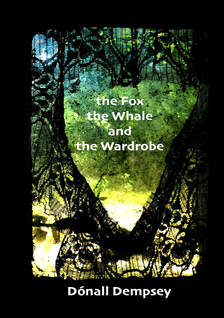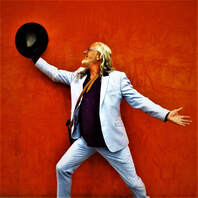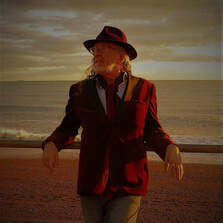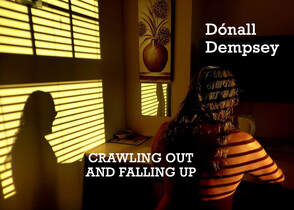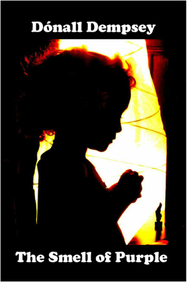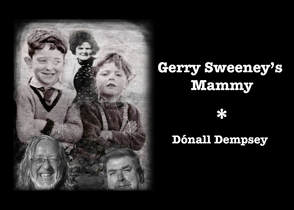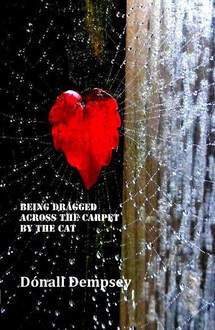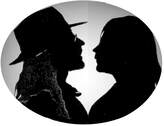‘One of the true outstanding figures of the Irish Outrider Troubadour tradition'
Launched in London on 12th July 2023 — Dónall Dempsey's new collection
THE FOX, THE WHALE AND THE WARDROBE
THE FOX, THE WHALE AND THE WARDROBE
"This morning I finished reading your anthology The Fox the Whale and the Wardrobe. I enjoyed this collection of poems immensely.... I think you write in an unselfconscious and direct way which does justice to the experiences or emotions the poems contain. I think the language of the poems is imaginative and often playful, occasionally surrealist too. Your poems made me laugh, feel sad and reflect. This for me is what art is about." – Owen Ostler (a buyer of the book)
|
ISBN 978-1-913329-80-3
148 x 210mm, french flaps, 120 pages VOLE Books, RRP £10.99 We regret that we can't send books outside the UK so THIS PAYPAL BUTTON IS FOR UK ORDERS ONLY. If we receive international orders through this button, we regret that we have to deduct the Paypal handling charge from a refund (about 10%).
|
In Dónall Dempsey’s sixth collection, published in 2023, he continues to explore themes of time and memory in poems that are playful, emotive, absurd, surreal, funny and moving.
Kathryn Southworth, reviewing in Sofia Literary Journal, writes:
'This collection, Dónall Dempsey’s sixth, is dedicated to “my Uncle Mikey, the treasure trove of my childhood” and, indeed, Irish childhood is a magical resource for the poet’s whimsical delight in language, people and performance. The title poem exemplifies the range of reference and emotion which can be achieved in simple narrative forms drawing on richly textured objects and events, narratives which evoke literary analogues, in this case C.S.Lewis, whilst asking fundamental metaphysical questions. The poem is addressed to his child sister, dead in a tragic accident, from which the poet hides in a wardrobe which is both literal, with his auntie’s fox stole and whale bone corset “smelling evilly of pink plastic”, and metaphorically a retreat from life where he can “Gather the darkness/about me/Dissolve into/the nothingness/I have/become”. This childhood loss haunts him and gathers memories of all “darkness”, against which the 67 year old man he has become seeks to comfort and make amends to the nine year old he was. An aspect of the “amends” is the poet’s ability to write the past, evoking its formative power with joy and ensuring it endures as what, in the final poem, he calls “Ever ever land”. All happiness may exist in “little snippets of time/and space”, as he puts it in the penultimate poem and even if the protagonists remain only in black and white photographs, “I/& the moment/keep happening/in the attic of my head”. Grief, then, is juxtaposed with celebration of life, love and moments of joy. Dempsey is not a believer in the comforts of religion: “the bell tolls/putting everything back in place/for those with faith/me, I /think the wind and crows/speak the truth” but that is not a cause for despondency”: there may be no God but “just/the sweet rain blesses me/with its good self” and a robin “unaware/that he’s my prayer”. Above all, people like his father are “the only religion/I could believe in”. “I pray to him”, the poet says in “Go Gentle”. At the other end of life is the three year old child Tilly, a source of joy and wisdom. In “Coming back to the world”, for instance, she wakes up sobbing that she fell asleep and potentially missed out on something happening. Comforted that the world, too, fell asleep, she snuffles “Good/I hate to miss/anything the world does”. This could be said of Dempsey himself, with his tactile poetry warm, as in the lovely “Le mie mani”, with hands, kisses, textures, affection. There is much conversation in these poems. Voice is given to molecules, goldfish, birds and even a ball. In “Tales told by birds” hatchlings are told stories of how they are the only survivors, as if humans “had never been invented”. Sometimes inanimate objects are whimsically brought to life, like the “Fallen angel on the graveyard shift” who gathers snowballs and which the poet persuades: ”Go on throw it” and “…she lets Him have it”. In “Don’t forget to write” the poet enters a dialogue with his own poem: “Make me proud”, he whispers as it leaves his mouth. Even in print, the poet is in dialogue with the reader. Instead of footnotes we have italicised asides like the introductions one might get in a live reading event. There are classic literary undertones everywhere in this book, nudges towards Eliot, Whitman and Yeats, amongst many, and more extensive engagements with Shakespeare, Joyce and Dickens, yet the levity of the showman and shades of the stand-up comic are always evident. Dempsey is distinctive in print in his short, unpunctuated lines and brief stanzas, and in person, in his dapper style and audience connection. As a school teacher he must have been memorable. On Twitter he is prodigious, inventive and refreshing. This reviewer must declare an interest, as someone supported by Dónall the publisher and his wife Janice, also celebrated in the book. Nevertheless, the range of feeling, the vitality, and love of life are clear to all. Dempsey concludes in “The Nothingness”, reflecting on his birth in 1956, “would I do it/again, given half a chance/you can bet my life/I would”. Would a reader want to hear more from this poet? I bet they would.' Mandy Pannett, writer, poet and editor, comments:
'An intriguing title leads the reader into a kaleidoscopic and scintillating poetry collection by Dónall Dempsey. There is a great variety of wit and humour in these poems. ‘My Molecules are Revolting’ uses dialogue as a device to illustrate the repartee between the Universe and a couple of molecules that currently inhabit the narrator’s body while they wait for ‘the Big Bang/of Death’ and the chance of belonging to a more interesting formation in the future. An amusing concept but it is always Death that hovers in the background. In the title poem there is the nightmarish texture of an aunt’s fox-fur stole which has ‘beady eyes alive with death.’ Every item of clothing in the dark wardrobe is ‘rotten now/eaten by time.’ Everything once belonging to loved ones is dead. ‘I cry for the death of summer,’ says the narrator. ‘I cry for the death of them all.’... " — Mandy Pannett, writer, poet and editor. ‘Dempsey is a master of the short, unpunctuated line that draws us into his world step-by-step, and it’s a place where we want to be immersed. A library returns to the woodland the books and furniture are made of, so that we stand among trees. Beloved relatives are conjured up from what remains, perhaps no more than an inherited hat. Although minimalist, these poems reach into the deepest subjects, taking us to a future where birds remain to recall how humans caused their own extinction. Through it all, darkness and light are woven together with deft magic.’
— Adele Ward, writer, editor and academic John W Sexton, poet, novelist, short story writer and radio scriptwriter, comments:
‘One of the true outstanding figures of the Irish Outrider Troubadour tradition, Dónall Dempsey is the oracle of the universal past, in whose hands the group mind of memory catches up with the present, outpaces it and advances into the future. In his sixth poetry collection, The Fox, The Whale & The Wardrobe, Dempsey once again inhabits all of his past moments, as son, nephew, father, partner, even objective observer; and the performative energy of the poems transfers those moments onto the reader, until we inhabit them also, and find ourselves performing as the very characters of the author's absurdist autobiographical folktale, where the poet is a Trickster surrounded by Tricksters, and reality flitters in and out, revealed as the greatest Trickster of them all.’ |
